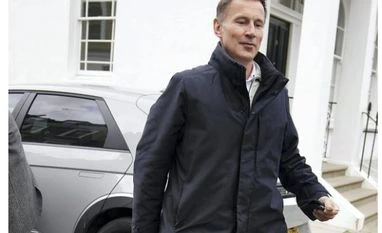Embattled British Prime Minister Liz Truss on Friday appointed former Cabinet minister and party leadership contender Jeremy Hunt as her new Chancellor, after she sacked close friend Kwasi Kwarteng in an effort to stem the economic turmoil unleashed by his mini-budget.
The Rt Hon Jeremy Hunt MP has been appointed Chancellor of the Exchequer, Downing Street tweeted.
Hunt was himself in the race for the top job after Boris Johnson resigned in July, but threw his weight behind former Chancellor Rishi Sunak after he did not get enough Conservative Party members backing him in the leadership election. His appointment is seen as Truss' attempt at closing the widening divide within the Tories, with many of Sunak loyalists in open rebellion against her policies.
In her letter to Kwarteng released on Twitter, Truss said she was sorry to lose him and indicates that she still believes in the broader economic vision laid out in the controversial mini-budget.
We share the same vision for our country and the same firm conviction to go for growth. You have been Chancellor in extraordinarily challenging times in the face of severe global headwinds, she writes.
It came in the course of a day of high political drama at the heart of Downing Street with the exit of Kwarteng in office at the UK Treasury for only 38 days. He took to Twitter soon after to confirm that he had been asked to step aside as Chancellor.
"As I have said many times in the past weeks, following the status quo was simply not an option. For too long this country has been dogged by low growth rates and high taxation - that must still change if this country is to succeed," his resignation letter reads.
More From This Section
It is important that we now move forward to emphasise your government's commitment to fiscal discipline. The Medium-Term Fiscal Plan is crucial to this end, and I look forward to supporting you and my successor to achieve that from the backbenches, he said, striking a conciliatory note.
Earlier, the finance minister cut short his visit to the US for an International Monetary Fund (IMF) meeting in Washington to fly back for a meeting with his boss. It had triggered speculation over his job and possible U-turns on the tax cuts he had tabled in Parliament, which had resulted in the pound plummeting against the dollar and the Bank of England stepping in to buy the country's long-term bonds to shore up the pension funds.
The estimated GBP 45 billion worth of tax cuts without a detailed funding plan to back it up were seen as disastrous for the UK economy at a time when inflation has already been soaring.
Truss and Kwarteng, who have been close friends for years, had insisted that the turbulence in the UK economy was part of a global problem exacerbated by the Russia-Ukraine conflict induced energy crisis and post-pandemic recovery.
"We have been colleagues and friends for many years. In that time, I have seen your dedication and determination. I believe your vision is the right one," Kwarteng notes in this departure letter.
An open revolt by Tory MPs and a record surge for the Opposition Labour Party in the opinion polls meant his position in Cabinet had become increasingly untenable after Truss announced the first major reversal of mini-budget policies when she backtracked on scrapping the 45-pence top rate of income tax for the wealthiest.
Another U-turn on the cards is expected to be that the government would raise corporation tax from 19 per cent to 25 per cent in April 2023, as tabled by former Chancellor Sunak and withdrawn by Kwarteng in his mini-budget.
)